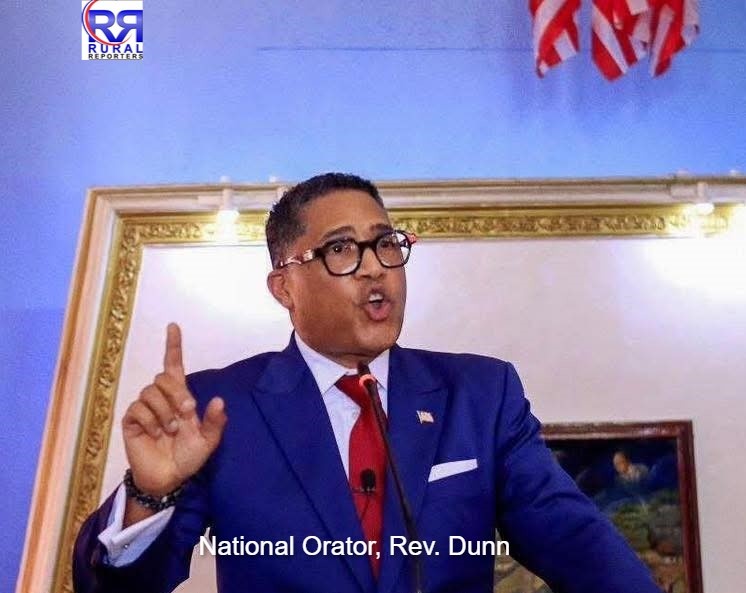By Olando Testimony Zeongar
MONROVIA – Liberia’s 178th Independence Day Orator, Rev. Emmett Dunn, has outlined what he termed ongoing challenges confronting the nation, rallying all Liberians to collectively confront such challenges.
In his Independence Day oration delivered at the historic Centennial Memorial Pavilion, in Monrovia, on 26 July, Dunn began pointing out challenges the nation is faced with, by asserting that public institutions in Liberia are deeply embedded with corruption.
He emphasized that to uproot such systemic corruption from the Liberian society, it will take more than policy.
“It will take moral courage and political will from the highest offices to the lowest,” said Dunn, who called on House Speaker Richard Koon, Senate Pro Tempore Nyonblee Karnga-Lawrence, soon-to-retire Chief Justice Sie-A-Nyene Yuoh, as well as President Joseph Boakai, to take charge of the national fight against corruption.
Speaking on the theme: “One People, One Destiny: Healing the Past, Building the Future”, National Orator Dunn observed that unemployment remains dangerously high in Liberia, indicating; “We cannot afford to let our people drift into despair, or worse, into the hands of those who would exploit their frustration.”
He noted that economic inequality is widening in the country, adding that too many Liberians go to bed hungry while a few grow richer with each passing day.
“We must reimagine a Liberia where opportunity is not reserved for the connected, but available to the committed,” said, Dunn, emphasizing that “Gender inequality continues to rob our nation of its full potential.”
He intoned that women still face systemic barriers, from unequal pay to unsafe public spaces, adding, “We must do more to protect them, empower them, and include them.”
The 2025 Independence Day Orator while acknowledging that Liberia’s education system is improving, pointed out that it is still fragile.
“Too many children still sit on floors. Too many schools still lack trained teachers,” he lamented, stressing the need not to settle for improvement, but to instead push for transformation.
Dunn bemoaned the proliferation of substance abuse in the country and declared it a national security risk, noting that drug abuse is silently destroying the future of youth of Liberia.
He indicated that substance abuse is also fuelling crime, unemployment, and hopelessness in the country, stating; “We must act before it is too late. The issue is both a health epidemic and a national security risk.”
However, the National Orator told Liberians that these are not reasons for them to be despaired, stating that they are rather reasons that required action.
“Liberia cannot fulfill its promise until every citizen, from West Point to Zwedru, from Voinjama to Fortsville, has a fair chance to thrive. The work of building Liberia must involve all of us,” he reminded Liberians.
Howbeit, Dunn cautioned Liberians to retrospect on their past before racing toward nation-building, restating this year’s Independence Day celebration theme, which he said invites every Liberian to take stock of the pathway they have traveled.
“As we reflect on the past, we must acknowledge that for too long, wounds have been left untreated: the wounds of tribalism, exclusion, economic injustice, and political and gender violence. We must dare to believe that tomorrow can be better, creating the space for reconciliation, dialogue, restorative justice, and for building bridges across our divides,” he stated.
He recalled that the recent reburial of former President Samuel K. Doe and the memorial service for former President William R. Tolbert, Jr. were bold actions that signaled President Boakai’s commitment to begin a process that was so long overdue.
“Then again, on July 5th, 2025”, Dunn told the Liberian leader; “you showed exemplary leadership when you, Mr. President, offered an apology to the Liberian people for the atrocities and injustice of years past,” adding; “Mr. President, on behalf of the People of Liberia, we accept your apology.”
He then proposed the establishment of a National Commission on Reconciliation, indicating that this is necessary because according to him reconciliation is an ongoing process, and that his recommendation was in an effort to build on what President Boakai has started.
The proposed National Commission on Reconciliation, according to Dunn, would be nonpartisan and inclusive, tasked with continuing the work of national healing from county to county, village to village, and town to town through historical truth-telling, civic education, and programs that promote social cohesion.
The proposed Commission would serve as a moral compass, reminding Liberians that reconciliation is a fundamental element to nation-building, according to Dunn.
However, the National Orator told Liberians that the work of healing is not the task of government alone, indicating that it is the responsibility of each Liberian, to lay down hatred, to uproot prejudice, to choose the hard work of peace over the ease of bitterness.
“It is time for us to confront the painful chapters of our history, not with anger, but with resolve—resolve to build a Liberia where such chapters will never be written again,” Dunn maintained.



